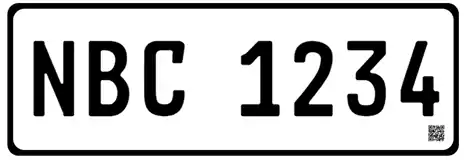
Vehicle license plates in the Philippines are issued and regulated by the Land Transportation Office (LTO), a government agency under the Department of Transportation (DOTr).
History
In January 2013, the Land Transportation Office began a license plate standardization project by issuing plates with modern security features, including holograms and bar codes. They also planned to slowly phase out the old 1981 plate format. In the current format, the LTO issues LLL-DDDD plates (where L represents a letter and D represents a one-digit number) for four-wheel vehicles and DDD-LLL/L-DDD-LL plates for motorcycles.

In 2016, the LTO issued "virtual plates" as a temporary measure to address the backlog in physical license plates. New vehicles were issued a virtual identification consisting of a combination of alphanumeric symbols, which will make it easier for the LTO to release the permanent license plates once they were available.[1] In August 2017, the Department of Transportation selected the winning bidder under the government's "Moving Forward Program" to reduce the backlog of 3.4 million plates spanning from July 2016 to December 2017. In January 2018, the Supreme Court ordered the release of license plates held due to restraining orders saddling the plate modernization program. It was expected that the distribution of new plates would commence at full swing by mid-February 2018. The machines were delivered to the LTO in February 2018 and were installed in a new plate making facility. The new license plates were released in July 2018 throughout the country. Under this new plate series, the first letter of the license plate will determine where the vehicle is registered. This is the same designation that was implemented during the 1981 series.[2]

Current plate design specifications
Plate Number Dimension and Font Style
The current version of the license plates measure 390 mm wide and 140 mm high, while current motorcycle plates released since 2020 measure 235 mm wide and 135 mm high. The characters are stamped on an aluminum plate, which is then painted with reflective paint. FE-Schrift was chosen as the font to be used on license plates in 2018 as the characters are designed to be difficult to modify.[3]
Registration Area Prefixes
After the release of the new plate number design in 2018, all virtual and temporary plates that were issued from July 2016 to December 2017 using the 2014 series design were updated to 2018's alphabetical designation.[4][5] The first letter in the 2018 automobile plate number design represents the prefix, which denotes the region where the vehicle was registered. The letter S is used to indicate a government-owned vehicle.
| Prefix | Region |
|---|---|
| B | Region 2 (Cagayan Valley) |
| C, R, W | Region 3 (Central Luzon) |
| D, O | Region 4A (CALABARZON) |
| E | Region 5 (Bicol Region) |
| F | Region 6 (Western Visayas) |
| G | Region 7 (Central Visayas) |
| H | Region 8 (Eastern Visayas) |
| I, A (motorcycles only) | Region 1 (Ilocos Region) |
| J | Region 9 (Zamboanga Peninsula), Bangsamoro Autonomous Region in Muslim Mindanao (BARMM) |
| K | Region 10 (Northern Mindanao) |
| L | Region 11 (Davao Region) |
| M | Region 12 (SOCCSKSARGEN) |
| N, P, Q, T, U, X | National Capital Region (NCR) |
| S | Government-owned vehicles |
| V | Region 4B (MIMAROPA) |
| Y | Cordillera Administrative Region (CAR) |
| Z | Region 13 (Caraga) |
Vehicle Classification by Color Scheme (2018 design)
| Pattern | Color | Class | Description | Image |
|---|---|---|---|---|
| PBC 1234
123PBC P123BC |
Black text on White background | Private Vehicles | Private vehicles, not for commercial use |   |
| PBC 1234
123PBC P123BC |
Black text on Yellow background | Public utility vehicles | Public utility vehicles and other for-hire vehicles (eg; Commercial trucks, public transport buses, taxis & jeepneys.) | |
| SBC 1234
123SBC S123BC |
Red text on White background | Government vehicles | Vehicles for official government use (eg; police cars, ambulances, and fire trucks). |   |
| 000 0000 | Blue text on White background | Diplomatic Vehicles | Vehicles in diplomatic use
|
 |
Vehicle Classification by Second and Third Letter
The second letter on the number plate classifies the type of vehicle. Letter U in the second letter represents a Private Used Trailer, while Z represents a Public Used Trailer. Trailers registered from 2016 onwards currently use 6-Numbered temporary plates as trailer plates are not yet in production.
| Classification | Position of letter assignment | Example |
|---|---|---|
| Private Trailers | Second letter is U | NUA 1234 |
| Electric Vehicle | Second letter may be from A to M
Third letter may be the following: V, W, X, Y, Z |
NHV 1234
NIV 5678 NGV 9012 |
| Hybrid Vehicle | Second letter may be from N to Z
Third letter may be the following: V, W, X, Y, Z |
JNW 4321
CRW 8765 NNV 2109 |
| Vintage Vehicle | Last two letters are the following: TX, TY, TZ | NTX 9876
BTY 5432 GTZ 1098 |
| Classification | Position of letter assignment | Example |
|---|---|---|
| Electric Vehicle | Second letter may be from V, W, X, Y, Z
Third letter may be the following: A to M |
D123VB
J209XK N124YM |
| Hybrid Vehicle | Second letter may be from V, W, X, Y, Z
Third letter may be the following: N to Z |
N583ZZ
C789WO G897VQ |
| Vintage Vehicle | Last two letters are the following: TX, TY, TZ | P123TX
N921TY K388TZ |
Motorcycle Classification by Color Strip and Position
Motorcycle registration plates released since 2020 features color-coded strips to indicate the region where they are registered, in addition to the registration area prefixes.[6]
| Strip Colour | Strip Position | Region | Image |
|---|---|---|---|
| None | - | National Capital Region (NCR) |  |
| Pink | Top | Cordillera Administrative Region (CAR) |  |
| Bottom | Region 13 (Caraga) | 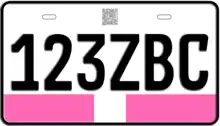 | |
| Green | Top | Region 1 (Ilocos Region) |  |
| Bottom | Region 8 (Eastern Visayas) |  | |
| Gray | Top | Region 5 (Bicol Region) | 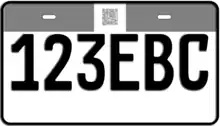 |
| Bottom | Region 10 (Northern Mindanao) |  | |
| Blue | Top | Region 3 (Central Luzon) |  |
| Bottom | Region 11 (Davao Region) |  | |
| Purple | Top | Region 4A (CALABARZON) | 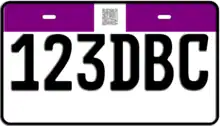 |
| Bottom | Region 6 (Western Visayas) | 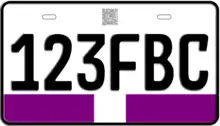 | |
| Orange | Top | Region 4B (MIMAROPA) | 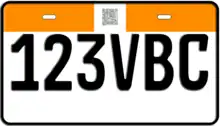 |
| Bottom | Region 7 (Central Visayas) | 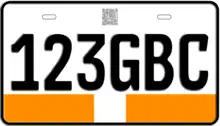 | |
| Red | Top | Region 2 (Cagayan Valley) |  |
| Bottom | Region 9 (Zamboanga Peninsula) |  | |
| Brown | Bottom | Region 12 (SOCCSKSARGEN) |  |
Special plate number designs
High-ranking government plates
These plates are reserved for top government officials of the Republic of the Philippines, and have the same paint scheme as private vehicles.
| Plate number | Use |
|---|---|
| 1 | President |
| 2 | Vice President |
| 3 | President of the Senate |
| 4 | Speaker of the House of Representatives |
| 5 | Chief Justice of the Supreme Court |
| 6 | Cabinet Secretaries |
| 7 | Senators |
| 8 | Representatives (Congressmen) |
| 9 | Associate Justices of the Supreme Court |
| 10 | Presiding Justice and other Justices of the Court of Appeals. |
| 11 | Chairman, Commission on Elections |
| 12 | Cabinet Undersecretary |
| 13 | Solicitor-General |
| 14 | Chief of Staff of the Armed Forces of the Philippines and Chief of the Philippine National Police |
| 16 | Regional Trial Court Judges (e.g. 16*NCR) |
| 17 | First Level Courts (Metropolitan Trial Court, Municipal Trial Court, Municipal Trial Court in Cities, and Shari'ah Circuit courts), added by Memorandum Order No. 297 signed by President Gloria Macapagal-Arroyo on March 2, 2009, for assistant city prosecutors, district prosecutors and chief city prosecutors. Stamped with initials of 17*ACP (court branch number). |
Diplomatic plates

The new diplomatic license plate contains seven numeric characters that are in blue with a white background. These plates are assigned to foreign diplomats, members of diplomatic missions, and international organizations in the Philippines. In October 2022 the LTO and DFA released these new diplomatic plates replacing the older ones, however, the old diplomatic plates and other exempted vehicles (OEV) plates can be still used and they will only be valid up to September 2023.[7]
The first 3 digits of the plate will indicate the assigned number of the country, and international organizations that are based in the Philippines. For example; 003 0045 is an assigned number to Australia. The next 4 digits of the plate are randomized registration digits and are assigned by the LTO and DFA, however, the 1000 number will always be assigned and reserved for the ambassadors.
The list below are the assigned number of each countries and organizations on new diplomatic license plates. The orders of the list are based on when the diplomatic relations started.
| The list of the assigned number of each country. | |||||||
|---|---|---|---|---|---|---|---|
| Number | Country | Number | Country | Number | Country | Number | Country |
| 001 | 021 | 041 | 061 | ||||
| 002 | 022 | 042 | 062 | ||||
| 003 | 023 | 043 | 063 | ||||
| 004 | 024 | 044 | 064 | ||||
| 005 | 025 | 045 | 065 | ||||
| 006 | 026 | 046 | 066 | ||||
| 007 | 027 | 047 | 067 | ||||
| 008 | 028 | 048 | 068 | ||||
| 009 | 029 | 049 | 069 | ||||
| 010 | 030 | 050 | 070 | ||||
| 011 | 031 | 051 | |||||
| 012 | 032 | 052 | |||||
| 013 | 033 | 053 | |||||
| 014 | 034 | 054 | |||||
| 015 | 035 | 055 | |||||
| 016 | 036 | 056 | |||||
| 017 | 037 | 057 | |||||
| 018 | 038 | 058 | |||||
| 019 | 039 | 059 | |||||
| 020 | 040 | 060 | |||||
Personalized plates
A motorist who would like to have personalized plates under the Optional Motor Vehicle Special Plate (OMVSP) can choose any letter combination upon these conditions:
- It is unique i.e., the plate does not have a registered duplicate anywhere else in the Philippines.
- The plate is not in the same with government plates.
- The motorist pays a minimum of PHP 15,000 ($300+) fee depending on the combinations.
- The plates may only be issued to private cars, Sports Utility Vehicles (SUV), Asian Utility Vehicles (AUV), Sports Pick-ups, and Commuter Vans [8]
| Combination | Fee | Image |
|---|---|---|
| Three-letter, two-number plate (except 00) | P25,000 |  |
| Three-letter, three-number plate (except 000) | P15,000 |  |
| Three-letter, four-number plate (except 0000) | P35,000 |  |
Temporary plate numbers
Conduction Stickers
The conduction stickers are temporary identification issued to vehicles in lieu of license plates while the official license plate are in production.
Motor Vehicle File Number
The MV File Number for each vehicle has 15 digits, which are based on where the initial registration of the vehicle was carried out. (e.g. MV File # 1301-00000012345 registered in NCR).
| Region | MV File Number | Temporary Plate
Number (PUV's) |
| NCR | 13**-***********
18**-*********** |
13****
18**** |
| CAR |
14**-*********** | 14**** |
| Region I | 01**-*********** | 01**** |
| Region II | 02**-*********** | 02**** |
| Region III | 03**-*********** | 03**** |
| Region IV A | 04**-*********** | 04**** |
| Region V | 05**-*********** | 05**** |
| Region VI | 06**-*********** | 06**** |
| Region VII | 07**-*********** | 07**** |
| Region VIII | 08**-*********** | 08**** |
| Region IX | 09**-*********** | 09**** |
| BARMM | 17**-*********** | 17**** |
| Region X | 10**-*********** | 10**** |
| Region XI | 11**-*********** | 11**** |
| Region XII | 12**-*********** | 12**** |
| Region XIII | 30**-***********
15**-*********** |
30****
15**** |
LTO-Authorized 6-digit temporary plate number
The temporary plate number was later issued by LTO, which has 6 digits based on where the initial purchase location of the vehicle was and its use as a PUV. (e.g. 130123 for NCR use). It is widely used due to extensive backlog of vehicle plate distribution from 2016 to 2019.
Public utility vehicles registered from July 1, 2016, onwards currently use private plates (white), MV File Number or the 6-digit Temporary Plate Number since yellow plates are in production.
Government vehicles registered from 2020 onwards currently use private plates (white). In November 2021 the LTO have already released new red plates for government vehicles registered from 2016 to 2019.
Former plate number designs still in use
2014 Series
Plate number design
The 2014 design, in production from 2014, used the numbering format LLL-DDDD for automobile vehicles, and LL-DDDDD for motorcycles. In this format, the region in which the vehicle is registered is stamped on the bottom of the plate, thereby removing the need for registration area prefixes (except for motorcycles).
The new plate format series and design was originally scheduled for release on September or October 2013.[13][14][15][16] However, it was delayed several times primarily due to concerns about the release of funds for the license plate project, as well as the increase in purchases of new cars using temporary license plates bearing the conduction sticker number.[17] Eventually, in May 2014, the first batch of new license plates was released.[18] By January 2015, vehicle owners using the 1981 series plates were required to pay PHP 450 to change their old plates into a modern series plate.
Vehicle Classification by Color Scheme (2014-2015 design)
| Pattern | Color | Class | Description | Image |
|---|---|---|---|---|
| ABC 1234
AB 12345 |
Black text on White background | Private Vehicles | Private vehicles, not for commercial use |  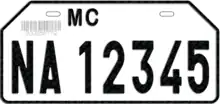 |
| ABC 1234
AB 12345 |
Black text on Yellow background | Public utility vehicles | Public utility vehicles and other for-hire vehicles (eg; Commercial trucks, public transport buses, taxis & jeepneys.) |  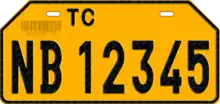 |
| SBC 1234
SA 12345 |
Red text on White background | Government vehicles | Vehicles for official government use (eg; police cars, ambulances, and fire trucks). |   |
| 00000 | Blue text on White background | Diplomatic vehicles | Vehicles in diplomatic use
|
 |
1981 Series
Plate number design
The 1981 design was the most widely used plate number design, in production from 1981 to 2014. LTO issued the numbering format LLL-DDD for automobile vehicles, and LL-DDDD and DDDD-LL for motorcycles. Color-coded year stickers appeared in 1982, based on the license plate's color scheme. Stickers for vehicle classification appeared in the same year.
Registration area prefix
The first letter in the 1981 series of license plates represents the prefix, which denotes the following region where the vehicle was registered. The letter S is used to indicate a government-owned vehicle.
| Prefix | Region |
|---|---|
| A | Region 1 (Ilocos Region) and Cordillera Administrative Region (CAR) |
| B | Region 2 (Cagayan Valley) |
| C | Region 3 (Central Luzon) |
| D | Region 4A (CALABARZON) and Region 4B (MIMAROPA) |
| E | Region 5 (Bicol Region) |
| F | Region 6 (Western Visayas) |
| G | Region 7 (Central Visayas) |
| H | Region 8 (Eastern Visayas) |
| J | Region 9 (Zamboanga Peninsula) and Bangsamoro Autonomous Region (BARMM) |
| K | Region 10 (Northern Mindanao) |
| L | Region 11 (Davao Region) and Region 13 (Caraga) |
| M | Region 12 (SOCCSKSARGEN) |
| N | National Capital Region (NCR) |
| P | |
| R | Region 3 (Central Luzon) |
| T | National Capital Region (NCR) |
| U | |
| V | Region 4A (CALABARZON) and Region 4B (MIMAROPA) |
| W | National Capital Region (NCR) |
| X | |
| Y | Region 7 (Central Visayas) |
| Z | National Capital Region (NCR) |
The letters I and O were not used in plates as the prefix to avoid confusion with the numbers 1 and 0. In 2009, they are displayed either in the middle or end, which is exclusively for private vehicles.
The letter Q was also used on regular plate circulation for motorcycles in public use. In 2009, it was used as a middle or last letter for NCR plates, while it was used as a last letter for Region 7 plates.
Vehicle classification by second letter
The second letter on the number plate classifies whether the vehicle is a wheeled trailer or an automobile. It is also used to classify whether the vehicle is private or public use. Letter U in the second letter represents a privately-used trailer, while Z represents a publicly-used trailer. Letters V, W, X and Y were used to indicate public utility vehicles. On the motorcycle license plates, U and Z represent private use for three-wheeled motorcycles, while V, W, X and Y represent public use in all types of motorcycles.
Vehicle classification by paint scheme
- Green on White: The most common type of registration plate, for privately owned vehicles. White background replaced by Rizal Monument in 2003 for automobiles.
- Black on Yellow: Commercial vehicle or public utility vehicles
- Red on White: Government-owned vehicles. Color white replaced by Rizal Monument in 2009 for automobiles.
- Blue on White: Vehicles in Diplomatic Use and Other Exempted Vehicles. Color white replaced by Rizal Monument placed in left side in 2009 for automobiles.
Inscriptions
- PILIPINAS ("Philippines", the most common inscription, in production 1981–1995, 2001–2003 for private and government vehicles, 2001–2014 for commercial and public utility vehicles)
- PHILIPPINES 2000 (1995–2000)
- ANGAT PINOY 2004 ("Rising Filipino 2004", in production 2000–2001)
- PILIPINAS - PERLAS NG SILANGAN ("Pearl of the Orient", in production 2002–2003)
- MATATAG NA REPUBLIKA ("Strong Republic", in production 2003 – April 12, 2014, for private, tourist and government vehicles)
- MC (used for private motorcycles, placed in top left)
- TC (used for motorcycles and tricycles in public use or for-hire, placed in top left)
Vehicle Classification by Color Scheme (1981-2014 design)
| Pattern | Color | Class | Description | Image |
|---|---|---|---|---|
| ABC 123
AB 1234 (Motorcycles) 1234 AB (Motorcycles) |
Green text on White background (1981-2003);
White text on Green background (rear only from 1988-1994); Green text on Rizal monument background (2003-2014) |
Private
vehicles |
Private vehicles, not for commercial use | .jpg.webp) |
| PVA 123
PV 1234 (Motorcycles) 1234 PV (Motorcycles) |
Black text on Yellow background (1981-1992; 1995-2014);
Yellow text on Black background (1992-1995 |
Public utility
vehicles |
Public utility vehicles and other for-hire vehicles (eg; Commercial trucks, public transport buses, taxis & jeepneys. |  |
| SBC 123
SB 1234 (Motorcycles) 1234 SB (Motorcycles) |
Red text on White background (1981-2003);
White text on Red background (rear only from 1989-1995); Red text on Rizal monument background (2009-2014) |
Government
vehicles |
Vehicles for official government use (eg; police cars, ambulances, and fire trucks). |  |
| 1000
10000 |
Blue text on White background (1981-1989; 1995-2003; 2014-2022);
Blue text on Blue background (1989-1995); Blue text on Rizal Monument background (2009-2014) |
Diplomatic
vehicles |
Vehicles in diplomatic use
|
 |
| GOB 123 | Red text on Yellow background (1981-2014);
Yellow text on Red background (rear only from 1989-1995) |
Official
bus |
Buses for official government use |
See also
- Unified Vehicular Volume Reduction Program, a road space rationing program used in Metro Manila and other urban areas based on the last digit of the vehicle's license plate.
References
- ↑ Ramirez, Robertzon (March 30, 2016). "LTO's 'Virtual Plates' Draw Flak from Netizens". The Philippine Star. Retrieved September 10, 2016.
- ↑ "Finally, LTO begins releasing 2016 vehicle plates". The Philippine STAR.
- ↑ "LTO Marks 106th Anniversary with Inauguration of Plate Making Plant".
- ↑ . LTO. June 28, 2018. Accessed October 16, 2018
- ↑ . CNN Philippines. April 10, 2018. Accessed October 16, 2018
- ↑ "LTO releases first batch of new motorcycle plates". August 27, 2020.
- 1 2 Joseph Pedrejas (December 2, 2022). "New license plates for diplomats in PH launched". Manila Bulletin. Retrieved January 25, 2023.
- ↑ "FAQ ON OPTIONAL MOTOR VEHICLE SPECIAL PLATES (OMVSP)".
- ↑ "The Land Transportation Office of the Philippines". Archived from the original on March 16, 2005. Retrieved May 7, 2005.
- ↑ "Optional Motor Vehicle Special Plates (OMVSP)". Archived from the original on March 16, 2005. Retrieved May 7, 2005.
- ↑ License Plates of the World – Philippines
- ↑ http://plaque.free.fr/as/rp/ Archived July 31, 2009, at the Wayback Machine Pictures of Philippine license plates from Francoplaque
- ↑ LTO to issue new series of license plates in mid-2013. GMA News. February 22, 2013. Accessed January 6, 2015
- ↑ Padua, Reinir. LTO to issue plates with bar codes by June. The Philippine Star. February 26, 2013. Accessed January 6, 2015
- ↑ Dumaboc, Fe Marie. LTO to roll out new vehicle plates in January 2013. Philippine Daily Inquirer. October 20, 2012. Accessed January 6, 2014.
- ↑ Get ready to scrap your car's license plates Archived July 26, 2013, at archive.today. BusinessWorld. Accessed January 6, 2015
- ↑ Agcaoili, Lawrence (February 23, 2014). "New license plates out April – DOTC". The Philippine Star. Retrieved March 13, 2014.
- ↑ Joel Locsin (May 8, 2014). "LTO releases 1st batch of new license plates". GMA News. Retrieved January 6, 2015.